 
|
||||
|
|
TOM SALVATORI |
|||
|
mwe3.com presents an interview with
Tom Salvatori: Thanks for asking Robert, I grew up in Elmhurst, Illinois, a suburb of Chicago…I am from a big family, one of seven kids growing up. We had complete freedom to immerse ourselves in music, and we would literally listen to album after album after album - everything from Alice Cooper to Cat Stevens to soundtracks like West Side Story, Psycho and the Sound of Music. My older brother Mike was our primary tastemaker, and we dove headlong into the Doors, Alice Cooper, Genesis, Yes, PFM, and Gentle Giant to name a few of our favorite bands. He informed my interest in prog rock with long, sprawling instrumental sections at a young age. Mike played guitar in a few local bands through his middle school and high school years, and he taught me my first chords on guitar when I was 12. He also taught me to drop the needle on the sections of the albums that I liked and to learn my favorite guitar parts by ear. I naturally gravitated to the songs that featured the acoustic/classical side of my heroes Steve Hackett and Steve Howe – and through needle drop, they were my teachers. I learned their music by ear. Early in high school, I started to show a real interest in the classical guitar. My parents encouraged lessons from local music teacher Duane Tutaj, who guided me toward placing first in the Illinois Music Association’s 1975 Senior Open in Classical Guitar division playing a Villa Lobos piece, Prelude 3. Based on that success, my parents then took me to Orchestra Hall in Chicago to see Andres Segovia perform… and he possessed such a formal, dominant, patriarchal stage presence that not only was I intimidated to hold my breath during his performance, but he literally scared the hell out of me, and I ultimately gave up the classical guitar… for a while. I am certain it was NOT the outcome that my parents had hoped for. I wound up growing my hair out and played in rock bands through my remaining high school years, turning to electric guitar, playing an Acoustic Black Widow guitar in a cover band called Phase IV with my neighborhood buddies and then during my Senior year (1976-1977), I played bass and 2nd guitar with my brother Mike and his wife Gail in an original prog rock band called Apocalypse. I played a 4/6 double neck (Ibanez) and when I would switch from playing bass to playing my guitar parts, I relied on the bass pedals from Gail’s cut down Hammond B3 organ - think Mike Rutherford!
When I returned to the Chicago area from college, I went to work in the Advertising Agency business and lived in, and raised my family, in Lombard, Illinois. I continued playing the nylon string guitar more so as a hobbyist from the mid-1980’s through the mid 90’s while quietly composing several dozen solo guitar pieces that eventually informed the start-up of Salvatori Productions. I now reside in Addison, just a couple minutes North of Lombard. mwe3: When did you form your record label Salvatori Productions and how many albums have you released and what other artists have you released on your record label? Also tell us about your brother Michael. You told me he has quite an impressive repertoire as well. Tom Salvatori: Let’s talk about Mike first because he got his start in the music industry way earlier than I did. He built out a home recording studio in his basement (MCS Recording), where he composed and recorded his solo folk/rock album Waiting for Autumn (1982). After that, and up through the late 1990’s, Mike enjoyed a career in partnership with friend Marty O’Donnell composing music for commercials, and they became known for the famous “Flintstone’s Kid’s” Vitamin jingle. In the late 1990’s, Mike and Marty turned their attention to composing music for Video Games – and then became known for their wildly popular and highly respected scores for the HALO Video Game Franchise. Because of the success of the HALO franchise, Mike and Marty were contacted by the attorney for Sir Paul McCartney, who advised that Sir Paul was himself interested in composing for Video Games. In 2012, Mike and Marty enjoyed collaborating with Sir Paul throughout the original Destiny music score along with a significant prequel body of orchestral work called Music of the Spheres; all of which was recorded in the UK at Abbey Road Studios with Sir Paul and recording engineer Giles Martin (Sir George Martin’s son) along with a full orchestra and choir. Mike continues to enjoy an award-winning career to this day composing music for the ongoing Destiny franchise. Getting back to the first part of your question, we started Salvatori Productions in 1995 (Mike is producing partner) because I had amassed several dozen guitar compositions that were only committed to memory and I realized if I ever got hit by the proverbial bus that my composing for the nylon string guitar would be lost forever if I didn’t record them. And I did exactly that between 1995 and 1998 – Under Cover of Darkness (1995) was a homemade analog session that was recorded during a summer thunderstorm. Based upon the success of that first release, I contracted for time in a local recording studio in Glen Ellyn, Illinois (Audio Access) and professionally recorded and released my full backlog of original solo guitar pieces as Invoking The Veiled Reference (1997) and Whispering For Your Attention (1998).Afterwards, my mind was finally free to look forward and my composing and project ideas became more ambitious and inclusive. I began seeking arranger alliances to add ensemble arrangements to my new works, which led to Late Night Guitar (2002). We then expanded our roster by signing U.K.-based piano composer Iris Litchfield in 2006, releasing two collaborative albums When Evening Falls (2007) and then our most ambitious chamber string ensemble project – a 2-CD set Ever Ever On (2010). Throughout the years 1995-2010, while in Chicago, Mike would bounce back and forth between his composing for video games and stepping in to help mix and master our releases at Salvatori Productions. We also produced four more solo piano albums from Iris’ catalogue before her passing in 2015.
Even though I was taking over the producer hat because Mike was now spending more time in Seattle, Washington, for Destiny, I have always additionally ‘tended to my knitting’ with my own compositions, resulting in solo guitar albums A Year in the Life (2013), Parlour Favorites (2016) and Respite Guitar (2020) along with several single and EP releases along the way that were little offramps from the main road for me… but loads of fun for myriad reasons. Ironically, while doing some housekeeping during the pandemic of 2020, I was digging through an old box of sheet music from the 1970s and found an old 8-track copy of a demo tape our band Apocalypse had recorded in a basement studio in Elmhurst in 1976, which we all thought was long lost when the reel-to-reel master burned up in a studio fire in 1999. This discovery led to a “fingers-crossed” conversion of the warbly old 8-track to digital files and then a re-mix of the cool prog rock songs Mike was composing for our band Apocalypse back then. It is a rough basement demo recording, but we were thrilled to find it and produce a reissue of these songs – the album is called Lost and Found (2020). mwe3: What guitars are you playing on your 2020 album Respite Guitar and why do you call the album Respite Guitar? I looked the word up and there’s a couple of different meanings from intermission to reprieve. It’s such a peaceful set of music that it’s easily among my favorite albums of 2020. Tom Salvatori: I play the same and only guitar I have ever played and recorded throughout all my composing and recording efforts – it is a 1972 Hernandis Grade #1 Classical Guitar that I acquired from Mike in a shrewd, no-blink trade for a Fender Showman amp back in 1975. He still argues I got the better end of the deal. With regards to the new album – first, thank you for your kind words! I chose the word “respite” mostly because of the pandemic – a respite is defined as “a short period of rest or relief from something difficult or unpleasant.” In this case, I specifically composed the pieces on this album with escapism in mind and then produced an “escape from urban New York” storyline for a protagonist I envisioned… I even named her Polly Feeney, who leaves the urban sprawl to spend the day alone enjoying the beauty of natural surroundings, passing through a flowery meadow, walking in solitude at the beach enjoying her time alone for reflection, remembrance and affirmation. I organized my guitar pieces in a manner that follows the linear storyline I had in my head and I then added my guitar pieces as a quiet and reflective soundtrack to align with the sounds of nature woven in as underscore. Because everything I compose is committed to memory before it is ever recorded, I have learned to rely on deeply visual elements and cues that aid in my memorization of the pieces I compose - almost like watching movie scenes over and over. So, these visual memories aided in the development of the arc of the storyline and made it easy to mix in nature sounds in the underscore.
Tom Salvatori: For Respite Guitar, it was nature sounds woven in as accompaniment…for Ever Ever On – it was chamber string ensemble on Disc 1 contrasted against the solo guitar and solo piano pieces as they were originally conceived on Disc 2. I have always loved the idea of comparing the original construct of a piece of music - as originally composed – contrasted against the enhanced effect a string arranger brings in development to elaborate and expand a more robust arrangement. mwe3: Did you do all the recording mixing and mastering on Respite Guitar and was anyone else involved in the album production or the musical influences? Tom Salvatori: It was 100% me…working alone in my home studio through the isolation of the pandemic. mwe3: When was Respite Guitar written and recorded and was it influenced by the 2020 pandemic? How did the pandemic and lockdown influence your music this past year? It must have been a good time to write and record music but the lack of live concerts is still a bad blow to the artists, musicians, and everyone else involved in the music world! Tom Salvatori: Well, as mentioned above, 2020 was a good time for composers and those of us who need alone time to produce our work. Ironically, it stands as the single most productive year ever for Salvatori Productions. We completed and released four widely-variant projects: our Lost and Found prog rock reissue… then I had a ton of fun with my I Like Beer EP which provided humorous relief to the more serious business of composing and producing Respite Guitar. And then in November 2020, we completed the recording, mixing and mastering of our most ambitious project of 2020 – singer/songwriter Paul Christian’s AAA/Heartland That’s Everything album. mwe3: Would you say Respite Guitar is a New Age or classical album? Is there a way to categorize the music you record and release on Salvatori Productions?
In spite of that grim outlook for support and encouragement from the classical guitar world, I have actually had my pieces transcribed by a publisher – back in 2004 the highly respected Les Productions d’Oz (Canada) issued a sheet music book with eleven of my compositions in it, which is still available today. When asked, I prefer the categories “Contemporary Instrumental” or “Neo-Classical” – which unfortunately are rarely available category options when registering my works. And my least favorite is the “New Age” category which I have tried to avoid because it tends to be associated with dated synth production techniques. And synth strings fly in the face of a rule of thumb at Salvatori Productions… we are committed to use real instruments and enjoy the effort of real strings players and performances on our releases. mwe3: You mentioned to me that one of the artists you worked with Iris Litchfield passed away. Tell us about working with Iris on earlier albums. How many albums did you record with Iris and what can you add about her 2013 album Life’s Journey? How were you involved with that album? Tom Salvatori: We ultimately released six albums with Iris Litchfield, one of which was released posthumously. And she was simply a breathtakingly remarkable, undiscovered talent when I met her in cyberspace on broadjam.com by reviewing one of her piano pieces. I had given it 5 stars but was a bit critical of the production…upright piano…squeaky pedal…and a swirling ceiling fan circling overhead. She wrote back with humility asking if I could help and we became fast friends and within months we were talking about signing her to Salvatori Productions, and reserving studio time for her to record in the U.K. on a Steinway grand piano to capture her work. Iris was so patient, kind, graceful and grateful – even while fighting her cancer diagnoses. I always respected the fact that she was a student of the piano first, taking lessons right up to the month of her passing in June 2014.
After those collaborations, we focused on recording and releasing the full complement of Iris’ catalogue as solo piano pieces Dream Clouds (2012),Romantic Interludes (2012) - a piano four-hands release recorded with her teacher Patrick Meehan, Life’s Journey (2013) and the posthumous release The Silence of My Being (2015). Our goal is to someday revisit Iris’ solo piano releases and take the time and care to weave in some beautiful John Catchings chamber string arrangements as a welcome contrast to the solo piano pieces. Mike produced the Salvatori Productions releases up to and including Dream Clouds, but soon after 2012 with his move to Seattle, I began wearing the producer hat! mwe3: You released a kind of classical guitar tribute album to rock icon Alice Cooper, in praise of the band’s iconic Love It To Death album. What brought that one on? You must have been a big Alice Cooper fan, yet your Ballad Of Dwight Fry is a fascinating classical guitar piece. I read there was an actor called Dwight Frye and Alice wrote it as a tribute to him but you also bring in music from two other tracks from Love It To Death. Do you still listen to Alice Cooper? It’s interesting how they became so popular in the early 1970s following their early association with Frank Zappa. Tom Salvatori: This idea - like many crazy ideas! - started as studio banter between Mike and I over the years. I had always joked that someday I would take a piece of music that represented the “least likely piece of music to ever be played on a nylon string guitar” and really try to interpret that piece of music. We joked about “The Gates of Delirium” by Yes…but “The Ballad of Dwight Fry” by Alice Cooper was always considered the standard bearer of this “least likely” contrast between us… it stood as a formidable example of an epic hard rock song likely impossible to interpret for nylon string guitar because Alice winds up going nuts in the song and is put into a straitjacket and is dragged kicking and screaming into an insane asylum against his will. The joke was…go ahead Tom…try interpreting that on a nylon string guitar! Challenge accepted. I finally was determined to tackle this impossible project in 2016 right after I completed producing Parlour Favorites (2016). I was in a reflective mood at the time - paying homage to all of my favorite composer/players from the 1970’s…so the feeling of nostalgia carried me into the unlikely project. I decided on a trilogy of songs…“Second Coming,” “The Ballad of Dwight Fry,” and “Sun Arise”from side two of the band’s Love It To Death (1971)release. I wove the three rock songs together as a thirteen-minute nylon string guitar suite that took over three months and 45 separate recorded guitar parts to accomplish – all performed on my 1972 Hernandis guitar. I worked on it every day for those three months, drawn deeply into the darkness of the storyline every time I dropped the needle on each section of the songs. I interpreted all parts…everything; from Alice’s vocal melody line to the power chords to the percussive elements to the screams of Alice going insane to the nausea of a purposefully out-of-tune Michael Bruce guitar solo …right down to the detailed cadence of the little girl’s haunting spoken-word section asking “Mommy…where’s Daddy? He’s been gone for so long…do you think he’ll ever come home?”
mwe3: Speaking of influences, your 2016 album Parlour Favorites is a stunning guitar tribute to your guitar heroes, and the album also mixes in some of your own original tracks. Your covers of Steve Howe, Steve Hackett, Robert Fripp and Jan Akkerman are great. What made you want to choose those tracks by those artists? I was glad to see you excerpted some music from Tales From Topographic Oceans, which is one of the least known Yes albums but it was also the first one that devoted a lot of the music to classical guitar, even more than when they touched on it with “Mood For A Day”, another track you also cover here. Have any of the guitarists you covered here heard your Parlour Favorites album? Tom Salvatori: I decided to record my own tribute to my heroes of guitar. It was learning to play their pieces by ear that was the most important music teacher I ever had. “Le Clochard” (Akkerman), “Peace, a Theme” (Fripp), “Horizons,” “Hands Of The Priestess” (Hackett), “The Ancient/Roundabout/Mood For A Day” (Howe)… these were the pieces that formed the foundation for my learning how to play the guitar. I also added a half dozen of my originals to the album – again to offer a bit of a compare/contrast in stylings and, overall, the album strikes more so a tone of similarity and consistency rather than widely variant differences. To say that these heroes were both teacher and stylistic influencers would probably be most accurate. mwe3: There’s also some spoof artwork on Parlour Favorites that kind of pokes fun at the “major labels” like Sony, Deutsche Grammophon, Naxos, etc but I guess it was all done in good fun. Do you feel the “majors” lost some of their status over the past decade? Speaking of good fun, I also like your I Like Beer EP, which features 4 different versions of the Miller Beer commercial. Is Miller still using that commercial? It was a hugely popular beer commercial from back in the day? Why did you do that track and are you still drinking Miller beer? I remember the “Colt 45” commercial and the Martini & Rossi commercial too. And Rheingold too! People today have no idea how important commercials were to selling their products...
So yes, besides being a contemporary nylon string guitar composer, I possess a cynically wicked sense of humor and love to skewer the conventions and constructs of the music industry, which I don’t really fit into, when I can. It sure is satisfying to poke at the beast once in a while, no? Ultimately, it is in the back of my mind that if someday one of my aforementioned guitar heroes actually sees the inside spread of my album artwork I hope it would make them laugh… or at least smile and shake their head! I must also say my sense of humor was a great crutch and a welcome diversion during the pandemic as well, and during our busiest of times of serious work at Salvatori Productions in 2020, I needed a humoristic off ramp from the main highway of recording and producing the diverse projects we had scheduled, so I paid due reverence to my collegiate years in Milwaukee, Wisconsin by honoring my favorite beer – Miller Beer – brewed just five blocks from my dorm room! On the I Like Beer EP, I recorded and produced a nylon string guitar rendition of Miller Beer’s famous 1970’s commercial theme “If You’ve Got the Time…We’ve Got the Beer.” And it truly was fun! mwe3: Also can you tell us something about your album A Year In The Life from 2013? Is it a concept album in that you dedicate the tracks to the month after which the tracks are written for? Tom Salvatori: Again, I compose in a very visual manner to help me memorize each piece prior to recording it. In constructing the album theme for A Year In The Life (2013), I was focused on visually and audibly capturing a compositional sense of each month of the year as it relates to something that was both thematic and ‘guitaristic’. For instance, January is traditionally a month of New Year’s resolutions, so not only is January’s composition entitled “Resolutions,” but it is composed in a manner that every phrase in the piece resolves. February the shortest month, so I abbreviated my composition for February to be the shortest piece on the album. March is a month of spring break trips and I’ve always felt that the best parts of the vacations are “The Roads Leading Home”. April is the month of renewal and also a season for falling in love and is thus underscored by a beautiful “Evening Waltz”. May is traditionally a month of new flowers, school graduation parties and the launching of ambition, so I present my most ambitious eleven-minute four-part “Springtime Suite in E Minor”.
July is the ‘running of the bulls’ month in Spain. “Pamplona” was composed to represent this event and visual images my mind conjured to help memorize this piece was of people quietly traveling to Spain from all over the world (verse part) and then participating/being swept away by viewing the enthusiasm of the actual street event (chorus part). “Waiting On Tomorrow” (August), “Father Time Is Calling” (September), “Yesterday’s A Day Away” (October) and “Reminiscing” (November) are all titles correlated to lyrics I had in my head to assist in the visualization and memorization of each piece, but when I assembled the collection of pieces for these four months, they also represent the “Golden Years” of life when things like Waiting On Tomorrow (planning to retire), Father Time Is Calling (advanced aging), Yesterday’s A Day Away (overcoming life’s regrets) and Reminiscing (remembering life’s good times) are common characteristics for the “last chapter” in our lives. Last but not least, for the month of December I present a medley of Christmas songs gently woven into a somewhat threadbare original composition. And, as a special encore bonus, I presented the nylon string guitar instrumental version as a prequel of a song called “New Year’s Eve, Turning into New Year’s Day”, which is a full-on They Might Be Giant’s-inspired rollicking rock-based party song that I composed (yes, music and lyrics) which is ready, willing and awaiting the right band to step up and record it! mwe3: Tell us about That’s Everything, the new Paul Christian album that you released in 2020 on your label. How did you meet and decide to record Paul? All the tracks are great. How did you work with Paul on the album and how did you work on the co-production?
His first album release, American Dream (2018) met with enough success that it encouraged an even deeper commitment to working on new songs for a follow-up album. Paul, the quickest learner I’ve personally ever known, had become so adept at recording, arranging and performing his vocal and instrumentation parts that he made our job much easier in the mixing and mastering stage… so much so that we promoted him to co-producer of his new album That’s Everything (2020). Again, thanks for the kind words about Paul’s songwriting, but we knew all along during the production of his new album that the songs were extra special. Who knows… if and when there’s a next release down the road for Paul we may just step aside and give him the keys to drive the whole project! mwe3: Now with the new year starting out in 2021, what plans do you have for the future? Even with so many changes happening as the world still deals with a terrible pandemic situation, are you hopeful for the music business moving forward? Tom Salvatori: We do have big plans going forward. We are approaching the 25th anniversaries of Invoking the Veiled Reference (1997) and Whispering For Your Attention (1998) and we are in discussions right now to hopefully crowdsource the funding we would need to go back to Nashville and hire John Catchings and his team to add chamber string ensemble arrangements to both albums for re-release as 2-CD sets; similar in approach to the Ever Ever On (2010) 2-CD release. And if we have success with that, we are hoping to re-visit the gorgeous solo piano releases from Iris Litchfield Dream Clouds (2012), Life’s Journey (2013), and The Silence Of My Being (2015) and find a way to move forward with adding chamber string ensemble arrangements to those piano pieces as well.
And through it all, I always tend to my knitting, by creating new guitar compositions for release. I’ll try to stay on the main road as much as possible, although I do have an eye for off ramps here and there…
|
|
|||
|
||||

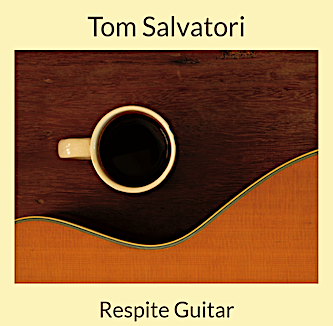 I was writing about the fretboard genius of Chicago-based, classical guitarist and composer Tom Salvatori ever since I first heard his CD Late Night Guitar, released way back in 2002, as well as his 2007 album When Evening Falls, recorded with the late U.K. pianist Iris Litchfield and cellist John Catchings, and released on the artist’s label Salvatori Productions. Following a series of album releases that are mentioned below, including a double CD made with the late Ms. Litchfield called Ever Ever On (2010) and a solo album called A Year In The Life (2013), I was lucky to reconnect with Tom again after hearing his 2020 album Respite Guitar. Essentially, a 7-track set mixed and presented in two different ways, Respite Guitar is one of the most impressive and most relaxing sounding solo acoustic guitar albums of 2020. Tom was always influenced by prog-rock guitarists such as Steve Hackett and Steve Howe, and in the spirit of those masters, Respite Guitar is skillfully performed on six-string, nylon string guitar. The key here is that the album takes on a different dynamic when track eight cues up and combines and recreates all seven tracks as one lengthy suite, complete with a variety of sound effects from the big city, (on the lead-off track “New York Minutes”), while then proceeding to recreate the other six tracks of music with a number of mostly meditative nature and ambient sounds. I like the idea that track 8, “Respite Guitar In Nature Suite” combines all seven tracks as one uninterrupted 28-minute piece of music complete with the ambient and nature sounds, all of which really adds a lot to the music. Throughout all the movements of Respite Guitar, Tom keeps the melodic-based guitar ideas at the center of his sound and, played acoustically, each one of these songs is like a classical-based work in its own right. The 7 tracks, followed by the seven-part “Respite Guitar In Nature Suite” combines for a total time of 50 minutes. Any way you view this CD, Respite Guitar is a true masterpiece of creative and very accessible guitar magic from guitarist / composer and producer Tom Salvatori. As mentioned above, Respite Guitar followed a series of other albums by Tom, including a unique, 13+ minute mini album released by Tom in 2017, called Ballad Of Dwight Fry Suite. Arranged by Tom for nylon string guitar, Ballad Of Dwight Fry Suite is actually a tribute to the fabled rock band Alice Cooper, focusing on the songs “Ballad Of Dwight Fry”, “Second Coming” and “Sun Arise”, which are all featured on the 1971 Alice Cooper album Love It To Death. In the spirit of guitar greats like Steve Hackett, Ballad Of Dwight Fry Suite is a remarkable performance that turns Tom’s tribute to a forerunner album of hard rock into a remarkably ear-opening classical guitar suite. Before Respite Guitar and Ballad Of Dwight Fry Suite, in 2016 Tom released Parlour Favorites, an 11-track tribute to his prog-rock guitar heroes including Steve Howe, Steve Hackett, Jan Ackerman and Robert Fripp, who are each covered here with a track apiece (Hackett’s music is featured on two tracks), the Parlour Favorites album is also enhanced by six Tom Salvatori originals. Salvatori completists will also note that Tom released another EP in 2020, a quite humorously titled one at that called, I Like Beer. Essentially four different solo guitar versions, played by Tom, of the famous Miller Brewing Company jingle, which was heard all over television and radio stations for years in praise of their world-renowned beer (“If You’ve Got The Time” – they’ve got the beer), and that was quite popular throughout the 1970s. Tom explains, “Just as having a couple Miller beers can provide a special comfort when it’s time to relax, this project, which was light and very fun indeed, served as a musical elixir of sorts to help balance the darker, spiraling abyss of immersion I experienced during my Alice Cooper Ballad Of Dwight Fry Suite project.” This little one off CD EP also provides clear proof that even classical guitarists like to inject a little humor, and maybe a little beer, into their hard work. Start with any of the above releases, while there are even more albums at Tom’s web site. Long-time fans of Tom Salvatori's original music will enjoy Respite Guitar, which is surely among finest solo guitar albums of 2020.
I was writing about the fretboard genius of Chicago-based, classical guitarist and composer Tom Salvatori ever since I first heard his CD Late Night Guitar, released way back in 2002, as well as his 2007 album When Evening Falls, recorded with the late U.K. pianist Iris Litchfield and cellist John Catchings, and released on the artist’s label Salvatori Productions. Following a series of album releases that are mentioned below, including a double CD made with the late Ms. Litchfield called Ever Ever On (2010) and a solo album called A Year In The Life (2013), I was lucky to reconnect with Tom again after hearing his 2020 album Respite Guitar. Essentially, a 7-track set mixed and presented in two different ways, Respite Guitar is one of the most impressive and most relaxing sounding solo acoustic guitar albums of 2020. Tom was always influenced by prog-rock guitarists such as Steve Hackett and Steve Howe, and in the spirit of those masters, Respite Guitar is skillfully performed on six-string, nylon string guitar. The key here is that the album takes on a different dynamic when track eight cues up and combines and recreates all seven tracks as one lengthy suite, complete with a variety of sound effects from the big city, (on the lead-off track “New York Minutes”), while then proceeding to recreate the other six tracks of music with a number of mostly meditative nature and ambient sounds. I like the idea that track 8, “Respite Guitar In Nature Suite” combines all seven tracks as one uninterrupted 28-minute piece of music complete with the ambient and nature sounds, all of which really adds a lot to the music. Throughout all the movements of Respite Guitar, Tom keeps the melodic-based guitar ideas at the center of his sound and, played acoustically, each one of these songs is like a classical-based work in its own right. The 7 tracks, followed by the seven-part “Respite Guitar In Nature Suite” combines for a total time of 50 minutes. Any way you view this CD, Respite Guitar is a true masterpiece of creative and very accessible guitar magic from guitarist / composer and producer Tom Salvatori. As mentioned above, Respite Guitar followed a series of other albums by Tom, including a unique, 13+ minute mini album released by Tom in 2017, called Ballad Of Dwight Fry Suite. Arranged by Tom for nylon string guitar, Ballad Of Dwight Fry Suite is actually a tribute to the fabled rock band Alice Cooper, focusing on the songs “Ballad Of Dwight Fry”, “Second Coming” and “Sun Arise”, which are all featured on the 1971 Alice Cooper album Love It To Death. In the spirit of guitar greats like Steve Hackett, Ballad Of Dwight Fry Suite is a remarkable performance that turns Tom’s tribute to a forerunner album of hard rock into a remarkably ear-opening classical guitar suite. Before Respite Guitar and Ballad Of Dwight Fry Suite, in 2016 Tom released Parlour Favorites, an 11-track tribute to his prog-rock guitar heroes including Steve Howe, Steve Hackett, Jan Ackerman and Robert Fripp, who are each covered here with a track apiece (Hackett’s music is featured on two tracks), the Parlour Favorites album is also enhanced by six Tom Salvatori originals. Salvatori completists will also note that Tom released another EP in 2020, a quite humorously titled one at that called, I Like Beer. Essentially four different solo guitar versions, played by Tom, of the famous Miller Brewing Company jingle, which was heard all over television and radio stations for years in praise of their world-renowned beer (“If You’ve Got The Time” – they’ve got the beer), and that was quite popular throughout the 1970s. Tom explains, “Just as having a couple Miller beers can provide a special comfort when it’s time to relax, this project, which was light and very fun indeed, served as a musical elixir of sorts to help balance the darker, spiraling abyss of immersion I experienced during my Alice Cooper Ballad Of Dwight Fry Suite project.” This little one off CD EP also provides clear proof that even classical guitarists like to inject a little humor, and maybe a little beer, into their hard work. Start with any of the above releases, while there are even more albums at Tom’s web site. Long-time fans of Tom Salvatori's original music will enjoy Respite Guitar, which is surely among finest solo guitar albums of 2020. 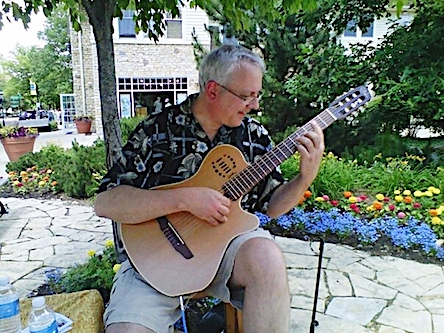 mwe3: Can you tell us where you’re from originally and where you live now? When were you first exposed to music and what artists and musical genres were among your early influences? Were you more influenced by classical guitar compared with rock guitar early in your life? I know you studied some amazing guitarists when you were young right? Who were some of your favorite guitarists from your early years?
mwe3: Can you tell us where you’re from originally and where you live now? When were you first exposed to music and what artists and musical genres were among your early influences? Were you more influenced by classical guitar compared with rock guitar early in your life? I know you studied some amazing guitarists when you were young right? Who were some of your favorite guitarists from your early years?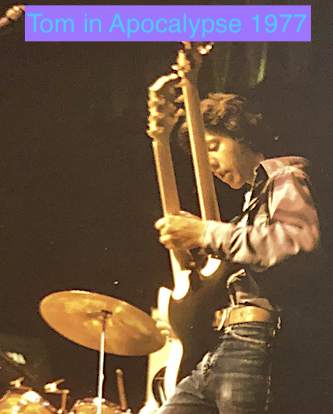 Apocalypse split up in the Fall of 1977 when Scott Magnesen our drummer and I went away to College at the same time Mike and Gail were busy starting their family. I began to pick up the classical guitar again at college, but this time on my own terms. I emphatically would say I play the nylon string guitar to try to disassociate myself from the classical world. I was beginning to compose my own little pieces that were quiet, melodic, relaxing and really had nothing to do with the classical guitar world.
Apocalypse split up in the Fall of 1977 when Scott Magnesen our drummer and I went away to College at the same time Mike and Gail were busy starting their family. I began to pick up the classical guitar again at college, but this time on my own terms. I emphatically would say I play the nylon string guitar to try to disassociate myself from the classical world. I was beginning to compose my own little pieces that were quiet, melodic, relaxing and really had nothing to do with the classical guitar world. 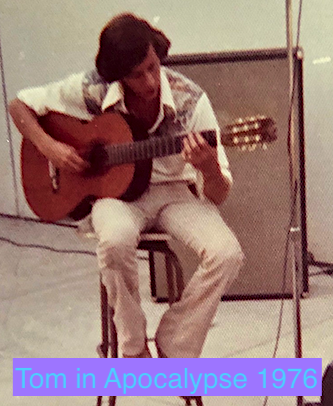 After our years collaborating with Iris, we further expanded our roster to include full rock band productions - in 2017 by signing R&B/Funk songwriter Gustavo (Buda) Acioli from Rio de Janeiro, Brazil and in 2018 AAA/Heartland songwriter Paul Christian from Chicago, Illinois.
After our years collaborating with Iris, we further expanded our roster to include full rock band productions - in 2017 by signing R&B/Funk songwriter Gustavo (Buda) Acioli from Rio de Janeiro, Brazil and in 2018 AAA/Heartland songwriter Paul Christian from Chicago, Illinois. 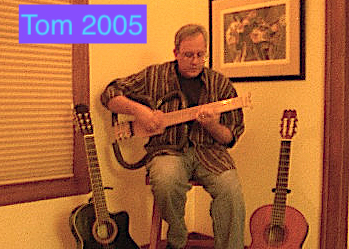 mwe3: There are 7 tracks on Respite Guitar yet you also have a track eight that runs 28 minutes combining all the pieces called “Respite Guitar In Nature Suite”. Why did you present the tracks in a different way with the nature sounds? But I like the idea that it then stands as one piece of music. You’ve done that before on your album from 2010 called Ever Ever On, where you add strings on a second disc. The added nature sounds on Respite Guitar gives the music a different dimension.
mwe3: There are 7 tracks on Respite Guitar yet you also have a track eight that runs 28 minutes combining all the pieces called “Respite Guitar In Nature Suite”. Why did you present the tracks in a different way with the nature sounds? But I like the idea that it then stands as one piece of music. You’ve done that before on your album from 2010 called Ever Ever On, where you add strings on a second disc. The added nature sounds on Respite Guitar gives the music a different dimension.  Tom Salvatori: I’ve struggled for decades with the “Classical” categorization, because for classical guitarists, it means institutional pedigree, studying and performing the works of the masters… like Andres Segovia for example. These are performers who don’t compose for the instrument but dedicate themselves to performance of the works of the great master composers. I don’t think the “classical guitar” world knows what to think of contemporary nylon string guitar composers, because frankly we are an anomaly and few and far between. The classical guitar publications certainly don’t reserve any column inches for composers like me, and there seems to be palpable contempt for composers who leans toward simple, soothing and melodic works. I suppose unless you are intent on breaking the boundaries of difficulty, dissonance or the childishly acerbic, the scholarly pedigree types and industry hoi polloi just yawn. It’s even worse for someone who, god forbid, plays by ear and not through an institutionalized degree and sheet music.
Tom Salvatori: I’ve struggled for decades with the “Classical” categorization, because for classical guitarists, it means institutional pedigree, studying and performing the works of the masters… like Andres Segovia for example. These are performers who don’t compose for the instrument but dedicate themselves to performance of the works of the great master composers. I don’t think the “classical guitar” world knows what to think of contemporary nylon string guitar composers, because frankly we are an anomaly and few and far between. The classical guitar publications certainly don’t reserve any column inches for composers like me, and there seems to be palpable contempt for composers who leans toward simple, soothing and melodic works. I suppose unless you are intent on breaking the boundaries of difficulty, dissonance or the childishly acerbic, the scholarly pedigree types and industry hoi polloi just yawn. It’s even worse for someone who, god forbid, plays by ear and not through an institutionalized degree and sheet music. 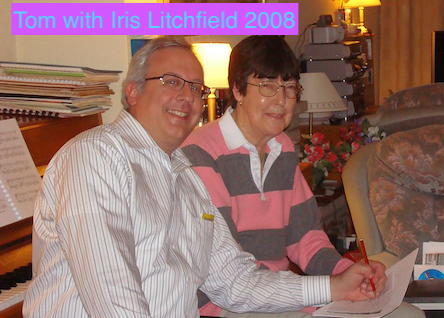 Stylistically, Iris and I were two peas in a pod, completely sympatico… primarily minor keyed, melodic and both of us intent on celebrating the simplicity of our instruments and enjoying lots of open spaces between the notes for our themes to breathe. On When Evening Falls (2007) and Ever Ever On (2010), we each contributed an equal number of our compositions to the releases, and then we collaborated with John Catchings, our cello player and string arranger to help tie the piano and guitar pieces together with his string arrangements.
Stylistically, Iris and I were two peas in a pod, completely sympatico… primarily minor keyed, melodic and both of us intent on celebrating the simplicity of our instruments and enjoying lots of open spaces between the notes for our themes to breathe. On When Evening Falls (2007) and Ever Ever On (2010), we each contributed an equal number of our compositions to the releases, and then we collaborated with John Catchings, our cello player and string arranger to help tie the piano and guitar pieces together with his string arrangements.  Suffice it to say it is the strangest and most misunderstood release in my entire catalog…with folks on all sides of the rock spectrum likely shaking their head in confusion and asking why I would even begin to undertake such a bazaar project. Ultimately, I will admit I did it for an audience of one - Mike. And I am glad I did it…I proved to myself (and to Mike!) that anything is possible if you set your mind to it. I do still worry that my straitjacket is being made…
Suffice it to say it is the strangest and most misunderstood release in my entire catalog…with folks on all sides of the rock spectrum likely shaking their head in confusion and asking why I would even begin to undertake such a bazaar project. Ultimately, I will admit I did it for an audience of one - Mike. And I am glad I did it…I proved to myself (and to Mike!) that anything is possible if you set your mind to it. I do still worry that my straitjacket is being made… 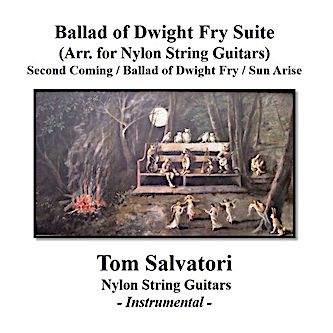 Tom Salvatori: This gets back to the fact that a contemporary nylon string guitar composer is a square peg in a round hole in the music world and will never get even a whiff of major label air. The major labels all follow the same formulaic path - their classical guitar world features recordings of the presenters, (my term) of the master composer works. David Russell - Christopher Parkening - Sharon Isbin - Julian Bream… the classical guitarists who get signed to the majors are NOT composers per se, they are the performers (i.e. presenters) of the master works from bygone eras.
Tom Salvatori: This gets back to the fact that a contemporary nylon string guitar composer is a square peg in a round hole in the music world and will never get even a whiff of major label air. The major labels all follow the same formulaic path - their classical guitar world features recordings of the presenters, (my term) of the master composer works. David Russell - Christopher Parkening - Sharon Isbin - Julian Bream… the classical guitarists who get signed to the majors are NOT composers per se, they are the performers (i.e. presenters) of the master works from bygone eras. 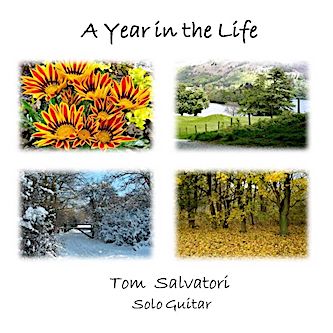 June is the month that traditionally crowns Hockey's Stanley Cup winner and I pay reverence to Chicago’s 2010 Cup winning goal with a piece called “Head Fake, Low Shot”. Ask any Chicago Blackhawks fan what that title means to them and they will tell you the story of Patrick Kane’s Stanley Cup winning goal with tears in their eyes. Again, its all visual for me, so the opening four-note sequence in that piece was cemented in my memory by attaching the four words “Head Fake, Low Shot” as a lyric that only existed in my head, thank goodness, to help memorize the piece. If you want to know the whole truth, I still have the butt from the cigar I smoked as a memento of the celebration from that wonderful night!
June is the month that traditionally crowns Hockey's Stanley Cup winner and I pay reverence to Chicago’s 2010 Cup winning goal with a piece called “Head Fake, Low Shot”. Ask any Chicago Blackhawks fan what that title means to them and they will tell you the story of Patrick Kane’s Stanley Cup winning goal with tears in their eyes. Again, its all visual for me, so the opening four-note sequence in that piece was cemented in my memory by attaching the four words “Head Fake, Low Shot” as a lyric that only existed in my head, thank goodness, to help memorize the piece. If you want to know the whole truth, I still have the butt from the cigar I smoked as a memento of the celebration from that wonderful night!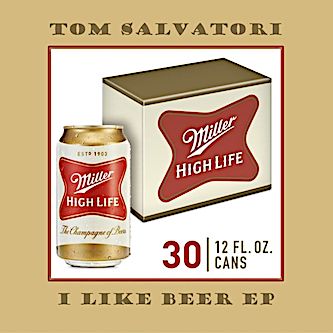 Tom Salvatori: Paul and I met at an April 2018 Chicago Cubs baseball game and while sitting in the Terrace Boxes at Wrigley Field chatting over a few beers, we struck up a conversation about music. Paul mentioned he was a guitar player and he played in various local bands over the years - most recently the Dangerous Joes – a popular cover band on the local bar scene. He then said something that caught my attention - that he enjoyed adding original songwriting ideas to a notebook as a hobby while raising his family. I gave him a business card and half-hearted encouragement to send me a demo someday and we parted ways, never thinking he would correspond. Well, a week later, he did, and what ensued was the discovery of a literal treasure trove of great songs! We became fast friends and colleagues and put a lot of hard work in to polish up, record and release each of the songs on his debut release to rightly bring his work to a worldwide audience.
Tom Salvatori: Paul and I met at an April 2018 Chicago Cubs baseball game and while sitting in the Terrace Boxes at Wrigley Field chatting over a few beers, we struck up a conversation about music. Paul mentioned he was a guitar player and he played in various local bands over the years - most recently the Dangerous Joes – a popular cover band on the local bar scene. He then said something that caught my attention - that he enjoyed adding original songwriting ideas to a notebook as a hobby while raising his family. I gave him a business card and half-hearted encouragement to send me a demo someday and we parted ways, never thinking he would correspond. Well, a week later, he did, and what ensued was the discovery of a literal treasure trove of great songs! We became fast friends and colleagues and put a lot of hard work in to polish up, record and release each of the songs on his debut release to rightly bring his work to a worldwide audience. 